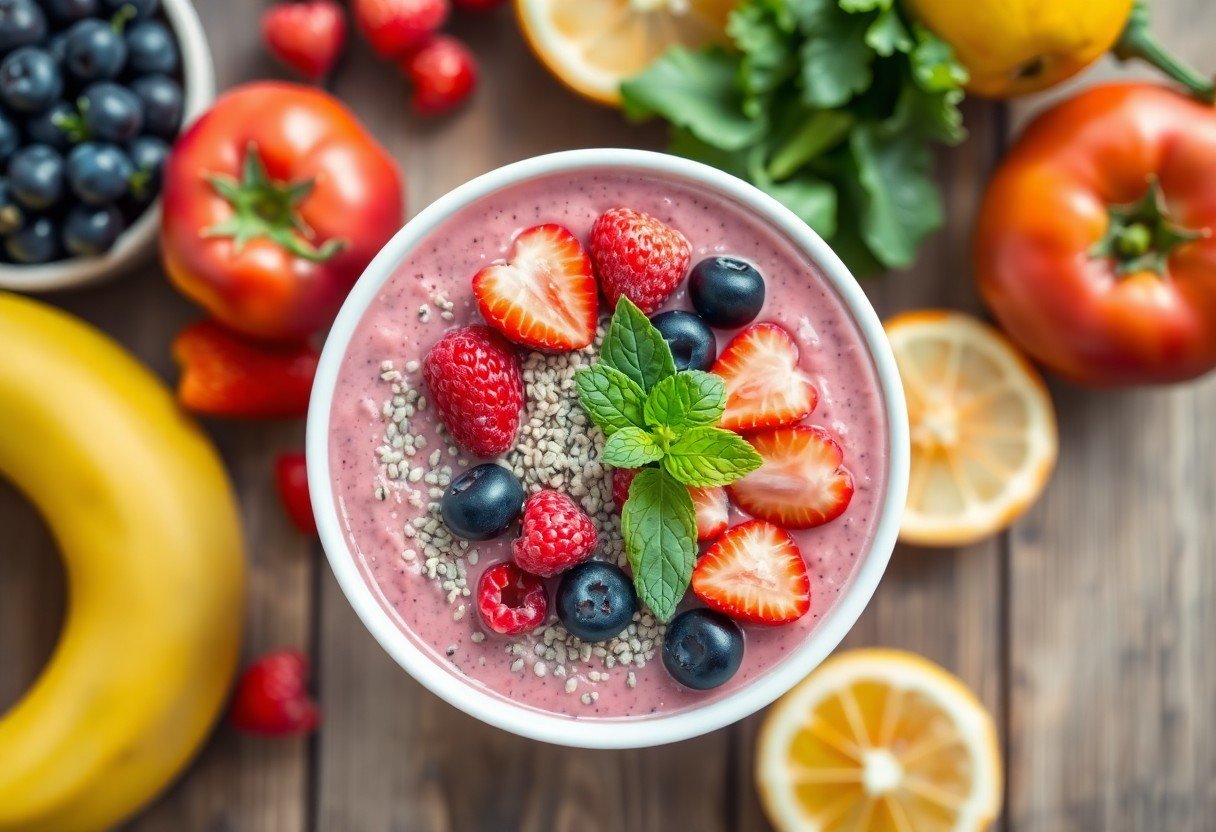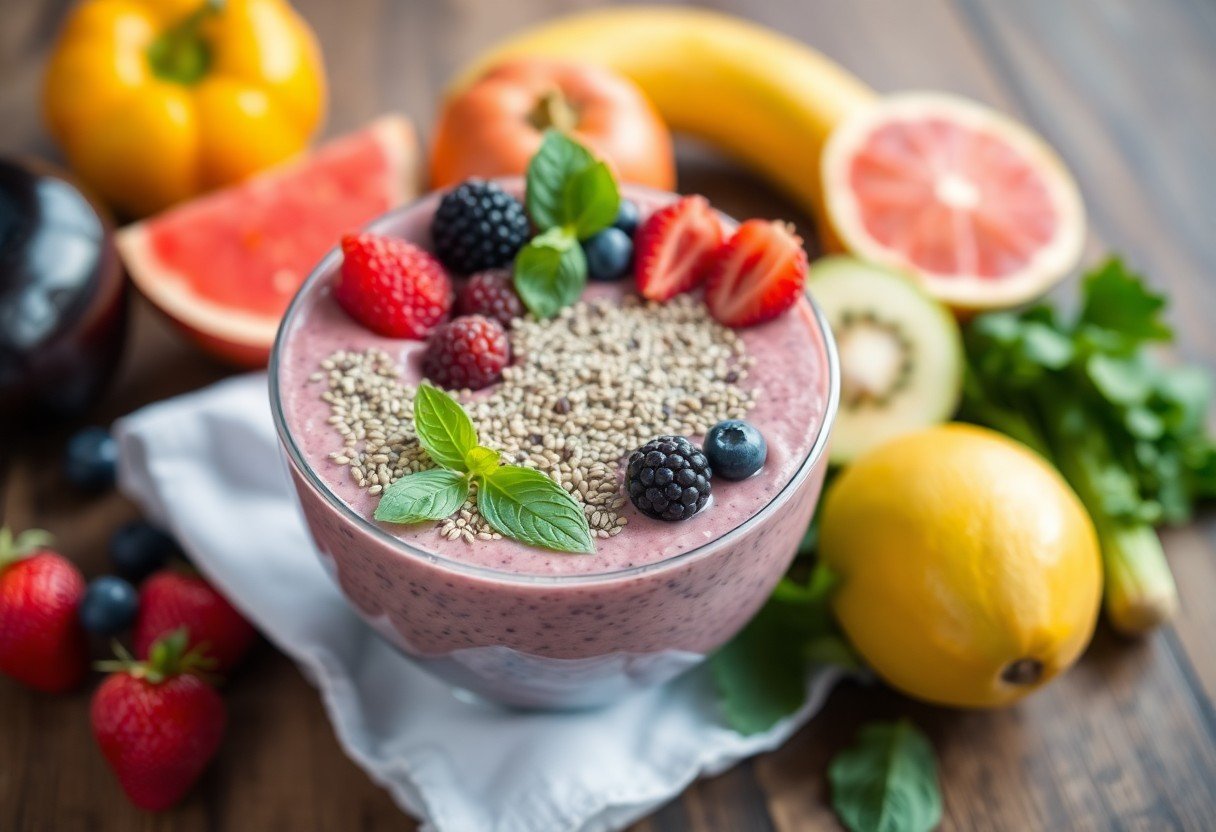It’s important to understand the nutritional elements that can significantly impact your health and well-being. Empowering your diet with hidden gems can provide the important vitamins and minerals that support not just physical growth but also mental and emotional well-being. Incorporating these foods into your daily meals can lead to improved energy levels, better mood regulation, and enhanced focus. In this post, you will discover some lesser-known nutritional powerhouses that can help you thrive, enabling your unique strengths and talents to shine brighter than ever!

Key Takeaways:
- Iron: Essential for building energy and preventing fatigue, especially for adolescent girls who experience menstruation.
- Calcium: Vital for developing strong bones and teeth, ensuring optimal growth during teenage years.
- Folate: Supports brain health and is important for overall development; found in leafy greens and legumes.
- Healthy Fats: Necessary for hormone regulation and brain development; sources include avocados, nuts, and seeds.
- Vitamin D: Important for calcium absorption and immune function, often gained through sunlight and fortified foods.
The Importance of Nutrition for Girls
While many aspects of life shape a girl’s growth, nutrition plays a pivotal role that cannot be overlooked. From the moment a girl begins to develop, the right nutrients can significantly influence her overall health, physical and emotional well-being, and even her ability to thrive in various aspects of life. Adequate nutrition supports your immune system, promotes optimal energy levels, and enhances physical performance, all of which are vital during the formative years. Focusing on balanced meals filled with vitamins and minerals enriches your body, helping you become a healthier, more resilient individual.
Physical Growth and Development
An imperative component of a girl’s development is physical growth, which is heavily influenced by the nutrients you consume. Iron, calcium, and protein are some of the primary building blocks that support strong bones, muscle development, and overall vigor. Insufficient intake of these nutrients can lead to a variety of issues, including stunted growth and weakened immunity, which may impede your ability to engage fully in school and activities. By prioritizing a diet rich in these indispensable nutrients, you empower yourself to reach your full physical potential.
Mental Well-being and Cognitive Function
Besides the physical benefits, nutrition greatly impacts your mental well-being and cognitive function. A well-balanced diet rich in nutrients, such as omega-3 fatty acids, antioxidants, and B vitamins, can enhance brain health and improve focus, memory, and emotional regulation. Diets lacking in these imperative components may lead to challenges such as anxiety, depression, and concentration difficulties, which can, in turn, affect your academic performance and social interactions. Adopting a nutrient-dense dietary pattern can help you develop resilience and positivity in both your mental state and daily activities.
The connection between nutrition and mental health is profound; the types of foods you choose to fuel your body can alter your mood and energy levels significantly. A diet high in processed sugars and unhealthy fats may contribute to feelings of lethargy and irritability, while incorporating fruits, vegetables, complex carbohydrates, and healthy fats can boost your overall mood and cognitive capabilities. Thus, making conscious, nutrient-rich food decisions can play a vital role in fostering your emotional stability and intellectual performance.
1. Iron-rich foods boost energy and cognitive function.
2. Calcium strengthens bones and supports overall growth.
3. Omega-3 fatty acids enhance brain health and mood.
4. Vitamins A and C strengthen immunity and skin health.
5. Whole grains provide sustained energy and fiber benefits.
6. Hydration supports concentration and overall physical performance.
Essential Nutrients for Thriving
There’s no denying that proper nutrition plays an *integral role* in the overall health and wellbeing of girls. Fueling your body with the right nutrients not only promotes *optimal physical growth* but also supports mental clarity, emotional stability, and resilience. By focusing on crucial vitamins, minerals, and macronutrients, you can empower yourself to thrive at every stage of life.
Vitamins and Minerals
One of the key components of a well-rounded diet is ensuring you consume enough *vitamins and minerals*. These micronutrients are necessary for key bodily functions such as *immune system support*, energy production, and *bone health*. For instance, vitamin D and calcium work together to strengthen bones, while iron is crucial for building hemoglobin, which helps transport oxygen throughout your body. Including a variety of fruits, vegetables, whole grains, and lean proteins in your diet can help you achieve adequate intake of these vital nutrients.
Macronutrients: Proteins, Carbohydrates, and Fats
One cannot overlook the significance of macronutrients in your diet, as they provide the *energy necessary* for daily activities and overall wellness. Proteins are fundamental for muscle repair and growth, carbohydrates serve as the primary energy source, and healthy fats are crucial for hormone regulation and brain function. Balancing these macronutrients in your meals ensures that you have the energy to not only *meet your daily demands* but also to thrive in your personal goals and ambitions.
In addition to understanding the roles of each macronutrient, it’s important to focus on the quality of these sources. Prioritize *lean proteins* such as poultry, fish, and legumes, as well as *complex carbohydrates* found in whole grains, fruits, and vegetables. Include healthy fats from sources like avocados, nuts, and olive oil to promote *optimal heart health*. By making *informed choices* about your macronutrient intake, you can create a diet that supports your physical growth, cognitive function, and overall quality of life.
Hidden Nutritional Gems
For every meal you prepare, there are opportunities to incorporate hidden nutritional gems that can enhance your diet and empower your well-being. These often-overlooked foods provide a myriad of health benefits that can positively impact various aspects of your life. By making informed choices about what you include in your meals, you can pave the way for a healthier lifestyle that not only nourishes your body but also boosts your energy levels and overall vitality.
Superfoods: Nutrient-Dense Choices
Around you lies an abundance of superfoods—ingredients packed with vitamins, minerals, and antioxidants. Foods like quinoa, chia seeds, and spirulina offer exceptional nutritional profiles that help support your immune system, improve your digestion, and maintain your overall health. By incorporating these nutrient-dense choices into your daily diet, you empower yourself with the imperatives needed to thrive. Consider blending these superfoods into your smoothies, salads, or even baked goods to effortlessly boost your nutrient intake.
Local and Seasonal Produce
Beside the superfoods, don’t underestimate the power of local and seasonal produce. Eating fruits and vegetables that are in season not only enhances their flavor but also ensures you’re consuming them at their peak nutritional value. Local produce is often harvested at the right time and transported a shorter distance, which means they retain more nutrients than their out-of-season counterparts. This also supports your community and reduces your carbon footprint, making it a sustainable choice.
Also, seeking out local farmers’ markets or joining a community-supported agriculture (CSA) program can lead you to discover new and exciting produce options. Seasonal fruits and vegetables like berries in summer or squash in fall provide a wealth of vitamins and minerals critical for your health. Additionally, these fresh ingredients can inspire creativity in the kitchen, allowing you to experiment with different recipes while ensuring your meals are packed with the goodness of nature’s bounty.
Building a Balanced Diet
Keep in mind that a balanced diet is necessary for empowering girls to thrive. Meal planning can be a powerful tool in ensuring you provide your body with all the necessary nutrients it needs. Planning ahead allows you to make informed choices and avoid unhealthy options. By prioritizing your meals, you can ensure that each plate is a tapestry of necessary vitamins and minerals, fostering energy, growth, and resilience.
Meal Planning Tips
Against common misconceptions, effective meal planning doesn’t have to be complicated or time-consuming. Here are some tips to help you get started:
- Set aside a specific day each week to plan your meals.
- Focus on including a variety of food groups in every meal.
- Prepare and pack your meals in advance to avoid unhealthy eating habits.
- Incorporate seasonal fruits and vegetables for freshness and flavor.
Recognizing the importance of a well-rounded meal can not only enhance your physical health but also your mental well-being.
Incorporating Diversity in Food Choices
Any attempt to enrich your dietary intake should focus on incorporating a diverse array of foods. Eating a wide variety of meals increases your access to vital nutrients and helps maintain your enthusiasm for healthy eating. Aim to include different sources of protein, whole grains, fruits, and vegetables to create colorful plates that can appeal to your taste buds. This variety not only supports your immune system but also combats the monotony that often discourages healthy eating.
To ensure you are consuming a range of different foods, consider experimenting with new recipes that feature unfamiliar grains, legumes, and exotic fruits. This approach not only adds nutritional value but also enhances the overall enjoyment of your meals. Being open to trying new flavors allows you to discover foods that can significantly contribute to your health and happiness. Furthermore, diversifying your diet helps mitigate the risk of deficiencies and encourages optimal growth and development in young girls.
Overcoming Nutritional Barriers
Now that we understand the significance of nutrition for girls to thrive, it is imperative to address the barriers that may hinder their access to a balanced diet. These barriers often manifest in two key areas: dietary restrictions and access to healthy foods. By recognizing and addressing these challenges, you can empower yourself or the young girls in your life to make better nutritional choices that contribute to their well-being and development.
Addressing Dietary Restrictions
Restrictions in diet can arise from various factors including allergies, preferences, and cultural practices. If you or someone you care for has specific dietary requirements, it is vital to seek out alternatives that fulfill nutritional needs without compromising health. For instance, if a girl is lactose intolerant, incorporating calcium-fortified plant-based milks or other dairy substitutes can help meet her calcium requirements. Always ensure that substitutes are rich in imperative nutrients, so they act as effective replacements rather than merely placeholders.
Accessing Healthy Foods
Around many communities, access to healthy foods can be severely limited. Food deserts, or areas with few grocery stores selling fresh produce and whole foods, can create significant obstacles. To navigate this challenge, seek out local farmers’ markets or community-supported agriculture programs that can offer fresher and often more affordable options. Additionally, considering community initiatives that grow vegetables and fruits in local gardens can foster both accessibility and knowledge about healthy eating.
Considering your environment, become informed about local resources that facilitate access to nutritious foods. Many communities offer programs designed to improve food access, such as mobile markets, nutrition education classes, and even food co-ops. Engaging with these opportunities can promote healthier eating habits, while also providing a sense of community support. By prioritizing these strategies, you can take an active role in overcoming the barriers that might hinder you or your loved ones from enjoying a diverse and healthy diet.
Empowering Girls through Nutrition Education
Despite the growing awareness of the importance of nutrition, many girls still lack access to vital information that could positively influence their health and well-being. By prioritizing nutrition education, you can help empower girls to make informed food choices that support their physical and mental development. It’s important that they learn not just about what to eat, but also about how to understand nutritional labels, the value of balanced meals, and the impact of food on their energy levels and mood. When girls become equipped with this knowledge, they are better prepared to resist societal pressures that often lead them to unhealthy habits.
Nutrition education goes beyond just individual learning; it encourages a community of support and shared experiences. Engaging girls in workshops or classes focused on cooking healthy meals and understanding dietary needs can foster a sense of belonging and collaboration. By fostering self-efficacy through education, you can contribute to developing confidence in their ability to make healthier choices, which in turn benefits their overall well-being and empowers them to advocate for themselves and others.
Tools and Resources for Learning
Around the world, numerous resources and tools are available to enhance your understanding of nutrition and help you support the girls around you. Schools can integrate interactive lessons that teach the science of nutrition, making the subject relatable and engaging. Online platforms and apps offer quick access to nutritional information and provide creative ideas for healthy recipes. Exploring these tools not only serves as guidance for personal diet choices but also enables you to pass on this important knowledge, making it a shared learning experience.
You can also find local community organizations that offer workshops, cooking classes, or even after-school programs focused on nutrition and healthy lifestyle habits. These avenues provide practical experience and reinforce the lessons learned in the classroom. By actively participating in such programs, you encourage a deeper connective understanding of food, fostering skills that will serve girls well into their future.
Community Engagement and Support
Between individuals and institutions, community engagement plays a significant role in the successful education of girls regarding nutrition. Local farms, nutritionists, and health experts can collaborate with schools to implement workshops or informational sessions tailored to the needs of young girls. Successful programs often involve mentorship opportunities, where older females share their experiences and knowledge about nutrition, thereby creating a supportive network that promotes healthy habits.
Considering the impact of community support can profoundly inspire girls to shape their understanding of nutrition through dialogue and shared experiences. When you actively engage with community members and resources, you promote a collective movement toward health awareness and advocacy. Collaborating with parents, peers, and local organizations can provide a network that encourages positive change, leading to lasting improvements in the nutritional knowledge and habits of girls. By working together, you collectively build a foundation for a healthier future, igniting empowerment from the ground up.
To wrap up
Ultimately, empowering girls to thrive involves providing them with knowledge about the hidden nutritional gems that can enhance their physical and mental well-being. Incorporating nutrient-dense foods like leafy greens, berries, nuts, and legumes into your diet can equip you with the vitamins and minerals necessary for growth, energy, and overall health. Understanding the benefits of these foods not only helps you make informed choices but also fosters a positive relationship with food, reinforcing the importance of nutrition in your daily life.
As you explore the world of nutrition, research deeper into the insights offered by experts. For instance, Hidden Gems: Meet Jessica Pearson of Path Nutrition reveals further secrets that can enhance your dietary choices. By embracing these hidden gems, you are taking proactive steps to ensure not just survival but flourishing health as you navigate through life’s challenges. Your journey toward empowerment through nutrition is just beginning.
FAQ
Q: What are some hidden nutritional gems that can benefit girls’ health?
A: There are several hidden nutritional gems that can greatly benefit girls’ health. Some examples include quinoa, which is rich in protein and fiber; chia seeds, packed with omega-3 fatty acids and antioxidants; lentils, a fantastic source of iron and folate; and sweet potatoes, which provide vitamin A and complex carbohydrates for sustained energy. Incorporating these foods into daily meals can promote healthy growth and overall well-being.
Q: How can leafy greens empower girls’ development?
A: Leafy greens like kale, spinach, and Swiss chard are packed with imperative vitamins and minerals. They provide high levels of calcium, iron, and vitamin K, which are important for bone health and development. Moreover, these greens are rich in antioxidants that can support the immune system. Including a variety of leafy greens in a girl’s diet can enhance her nutritional intake and promote long-term health benefits.
Q: Why should girls consider including nuts and seeds in their diet?
A: Nuts and seeds are excellent sources of healthy fats, protein, and various vitamins and minerals. Almonds, walnuts, sunflower seeds, and pumpkin seeds are especially beneficial. They provide imperative omega-3 fatty acids, which support brain health and cognitive function, and are also loaded with fiber, which aids digestion. Incorporating these into snacks or meals can boost energy levels and contribute to a balanced diet.
Q: What role does fermented food play in girls’ nutrition?
A: Fermented foods like yogurt, kefir, kimchi, and sauerkraut are rich in probiotics, which promote gut health. A healthy gut microbiome can have a positive impact on mood and overall wellness. For girls, maintaining a balanced gut can also contribute to nutrient absorption and a robust immune response. Including fermented foods in their diet can enhance digestive health and support emotional well-being.
Q: How can incorporating whole grains support girls’ energy levels?
A: Whole grains such as brown rice, oats, and whole wheat are excellent sources of complex carbohydrates, providing sustained energy throughout the day. They are also high in fiber, which helps in maintaining stable blood sugar levels and promotes fullness. By including whole grains in their meals, girls can improve their energy levels and support their active lifestyles and academic performance.

